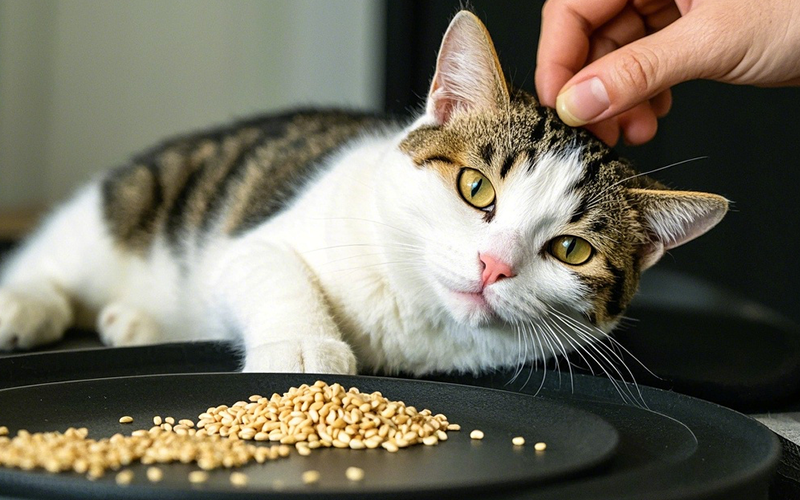Can Cats Eat Sesame Seeds? A Guide to This Popular Snack and Your Feline Friend
- 29 Mar 2025 11:13
Sesame seeds are commonly used in various foods and snacks, but when it comes to your cat, you might be wondering, “Can cats eat sesame seeds?” The short answer is yes, sesame seeds are not toxic to cats and can be consumed in small amounts. However, there are a few things to consider before sharing this seed with your feline friend. Let’s take a closer look!

The Benefits of Sesame Seeds for Cats
Nutritional Value: Sesame seeds are rich in healthy fats, proteins, and minerals such as calcium, magnesium, and iron. These nutrients can benefit your cat in moderation, particularly in supporting bone health and providing a small amount of fiber.
Rich in Antioxidants: Sesame seeds contain antioxidants like lignans, which help fight free radicals and support overall health. However, cats typically don't need a large amount of these nutrients, and the benefits may not be as significant as they are for humans.
Things to Keep in Mind
Moderation Is Key: While sesame seeds are not harmful, they should only be given in moderation. Too many seeds can contribute to an excess of fats or calories in your cat's diet, which could lead to weight gain or digestive issues. A small sprinkle on top of your cat’s food or as an occasional treat is enough.
Choking Hazard: For small cats, sesame seeds can be a choking hazard, especially if they’re not properly chewed. Make sure to break them into smaller pieces or choose a safer option for your cat, such as finely ground seeds.
High in Fats: Sesame seeds are high in fats, and although these are healthy fats, overconsumption could lead to an upset stomach or diarrhea in cats. It’s important not to overfeed fatty treats.
Allergic Reactions: Some cats may have allergies or sensitivities to certain seeds, including sesame. If you notice any unusual behavior, like vomiting or diarrhea, after offering sesame seeds, stop feeding them immediately and consult a pet health professional.
How to Serve Sesame Seeds to Your Cat
Sprinkle Over Food: A tiny sprinkle of sesame seeds over your cat's regular food can add some variety and provide a little extra nutrition.
Mix with Wet Food: If your cat enjoys wet food, you can mix a small amount of sesame seeds in with their meal.
As a Treat: Give a few sesame seeds as an occasional treat. Just make sure it’s in small quantities.
Symptoms to Watch For
If your cat has eaten too many sesame seeds or has an adverse reaction to them, keep an eye out for the following symptoms:
Vomiting
Diarrhea
Lethargy or weakness
Loss of appetite
If your cat shows any of these symptoms, reduce the amount of sesame seeds you are offering or eliminate them entirely from their diet. If symptoms persist, contact a pet health professional immediately.
Safer Alternatives for Cats
If you're looking for safer treats for your cat, here are some good alternatives:
Cooked Meat: Chicken, turkey, or fish are excellent, protein-rich treats that are much better suited to your cat’s dietary needs.
Catnip: A safe and fun treat that many cats love for stimulation and entertainment.
High-Quality Cat Food: Stick to specially formulated cat food to ensure your cat is getting the proper nutrition they need.
Conclusion
In conclusion, sesame seeds are generally safe for cats when given in moderation. They can provide some nutritional benefits but should not be a regular part of your cat’s diet due to their high fat content and potential choking hazard. If you're unsure about your cat’s diet or if they experience any negative symptoms after consuming sesame seeds, PettureX is a great tool for quick consultations and health assessments. Always keep your cat's dietary needs in mind when offering new foods! 🐾
Related

Frankly Dangerous: Can Cats Eat Hot Dogs? Vet Explains the Serious Risks
- 16 Apr 2025
A Purrfect Protein? Can Cats Eat Ground Turkey Safely? (Vet-Reviewed Guide)
- 16 Apr 2025
Gritty Situation: Can Cats Eat Grits Safely? Vet Explains the Risks
- 16 Apr 2025
Gravy Danger Zone: Can Cats Eat Gravy Safely? (Vet-Reviewed Warning)
- 16 Apr 2025
Crunchy Query: Can Cats Eat Green Peppers? A Vet-Reviewed Safety Analysis
- 16 Apr 2025
Toxic Temptation: Can Cats Eat Grapefruit? Vet Explains the Dangers
- 16 Apr 2025
Emergency Meal or Major Mistake? Can Cats Eat Dog Food For A Couple Days? (Vet Guide)
- 16 Apr 2025
Dandelions & Felines: Can Cats Eat These Common Weeds Safely? Vet Explains
- 16 Apr 2025
Flaky Danger: Can Cats Eat Croissants Safely? Vet Explains the Buttery Risks
- 16 Apr 2025
Hazard Alert: Can Cats Eat Corn Husks? Vet Explains Dangers of This Fibrous Material
- 16 Apr 2025
